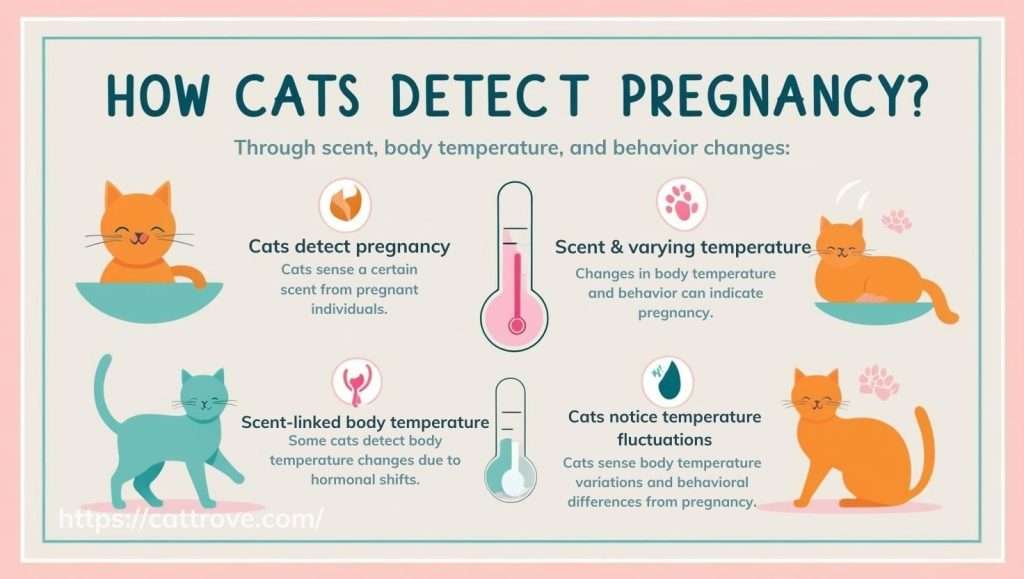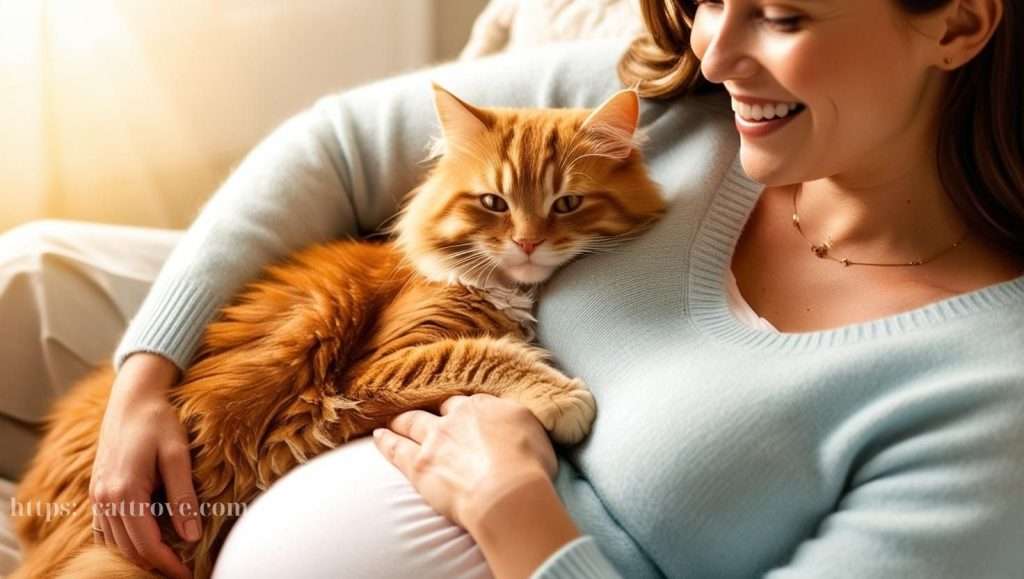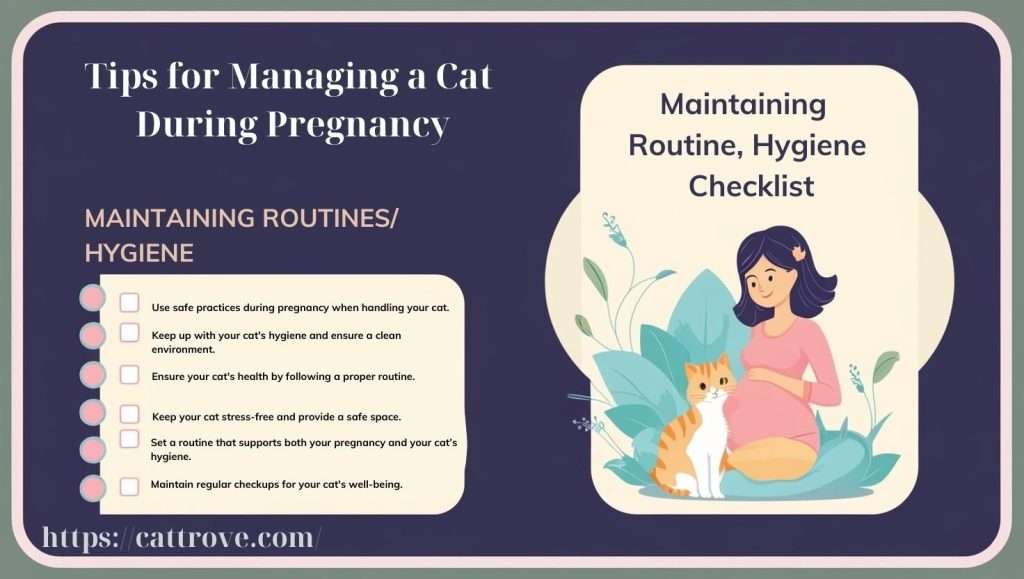1. Introduction
Can cats sense pregnancy? Many cat owners claim their furry friends act differently when they’re expecting. While science hasn’t fully explained it, countless stories suggest cats notice changes in their pregnant owners. In this article, we’ll explore the science, common behaviors, and tips to keep your cat happy during this special time.
2. Why Cats and Pregnancy Matter
Pregnancy isn’t just a life-changing time for you—it’s a big adjustment for your pets too. Cats are observant and sensitive creatures. Understanding how your pregnancy affects them can help maintain harmony in your home. Knowing whether cats can sense pregnancy can also strengthen the bond you share with your feline friend.
3. Can Cats Sense Pregnancy?
The short answer is yes, but not in the way you might think. Cats don’t understand pregnancy, but they are experts at picking up on changes in your behavior, scent, and routine.
- Scientific Evidence: No conclusive studies confirm that cats sense pregnancy. However, experts believe that cats’ keen senses might detect subtle physical changes, like hormone shifts or new pheromones.
- Anecdotal Stories: Many pet owners share heartwarming stories of their cats acting differently, becoming more affectionate, or guarding them during pregnancy.
4. How Cats Detect Pregnancy
Cats are incredibly intuitive animals. Here’s how they might sense the changes:

- Smelling Hormonal Shifts: Cats have an excellent sense of smell. Hormonal changes during pregnancy may alter your scent, which cats can easily notice.
- Sensing Body Temperature: Pregnant women often have a slightly higher body temperature. Cats, who enjoy warmth, might find this appealing and stick closer to you.
- Observing Behavior Changes: Pregnancy often brings new habits, such as resting more or moving differently. Cats pick up on these cues and adjust their behavior accordingly.
5. Common Cat Behaviors During Pregnancy
If your cat senses something different about you, they might show it through their actions:
- Increased Affection: Many cats become more loving, seeking extra cuddles and staying close to their owners.
- Protectiveness: Some cats act like bodyguards, watching over you or staying near your side.
- Clinginess: Independent cats might suddenly demand more attention.
- Mood Swings: Cats can also act grumpy or distant as they adjust to the changes in your behavior.

Each cat is unique, so their reactions will depend on their personality.
6. Why Cats Act Differently Around Pregnant Owners
Cats’ reactions to pregnancy are rooted in their sensitivity to their environment:
- Hormonal Changes: New scents and pheromones can trigger behavioral shifts in cats.
- Routine Disruptions: Cats thrive on routine. Pregnancy might change your schedule, which can unsettle them.
- Emotional Connection: Cats are empathetic and often mirror your emotional state, whether you’re happy, anxious, or tired.
7. Are All Cats Affected by Pregnancy?
Not every cat will react to pregnancy in the same way:
- Affectionate Cats: These cats might become even more cuddly and clingy.
- Independent Cats: Shy or aloof cats may not show any noticeable changes.
- Past Experiences: Cats that have previously been around pregnant people might adjust more easily.
Remember, every cat is unique, so don’t worry if yours doesn’t act differently—it doesn’t mean they care about you any less.
8. Should You Be Concerned About Your Cat During Pregnancy?
While most cats adapt well to their owner’s pregnancy, here are some things to watch out for:
- Territorial Behavior: Some cats might mark their territory more often or become possessive.
- Toxoplasmosis: Pregnant women should avoid handling cat litter to reduce the risk of toxoplasmosis. Always wash your hands after interacting with your cat.
By addressing these concerns and maintaining a calm environment, you can ensure a smooth transition for both you and your cat.
9. Practical Tips for Managing Cats During Pregnancy

Here’s how to keep your cat happy and stress-free during your pregnancy:
- Stick to a Routine: Feed, play, and interact with your cat at the same times every day to maintain stability.
- Gradually Introduce Changes: If you’re setting up a nursery, let your cat explore the new space slowly.
- Maintain Hygiene: Avoid cleaning the litter box yourself if possible. If you must, wear gloves and wash your hands thoroughly.
- Give Them Attention: Spend quality time with your cat to reassure them of their importance in your life.
- Prepare for the Baby’s Arrival: Play recordings of baby sounds to help your cat adjust to the new noises.
10. Conclusion
Cats are sensitive creatures who often notice subtle changes in their environment. While they may not understand pregnancy, they can sense that something is different. By observing your cat’s behavior and providing them with love and stability, you can ensure they adapt to this exciting chapter in your life.
Whether they become extra cuddly or protective, your cat is simply responding to the changes they see and feel. Embrace their unique way of showing care, and you’ll strengthen your bond during this special time.
You might also like: Pregnant Cat Nipples vs Normal: Signs, Changes, and Care Tips
Cats and Human Pregnancy FAQs
Cats detect pregnancy primarily through their acute sense of smell. They can pick up on subtle hormonal shifts (like rising progesterone and estrogen) and new pheromones that alter your natural scent. Additionally, they notice physical changes like increased body temperature and changes in your daily routine.
Your cat may become clingy because they are attracted to your higher body temperature, which provides them with extra warmth. Furthermore, cats are sensitive to emotional changes; if you feel anxious or tired, they may stay close to offer comfort or seek security due to the disruption in their environment.
No, pregnant women should avoid cleaning litter boxes due to the risk of toxoplasmosis, a parasitic infection transmitted through cat feces that can harm an unborn baby. If you must do it, wear gloves, wash your hands thoroughly immediately after, and change the litter daily.
Yes, some cats can exhibit jealous behaviors, such as acting distant, meowing excessively, or urinating outside the litter box. This is not because they understand pregnancy, but rather a reaction to receiving less attention or feeling stressed by the changes in household routines and smells.
While not scientifically proven, it is possible. Cats have much better hearing than humans and can detect ultra-low frequencies. As the pregnancy progresses, your cat might rest their head on your belly, potentially listening to the new rhythmic sound or feeling the vibration of the baby’s movements.

